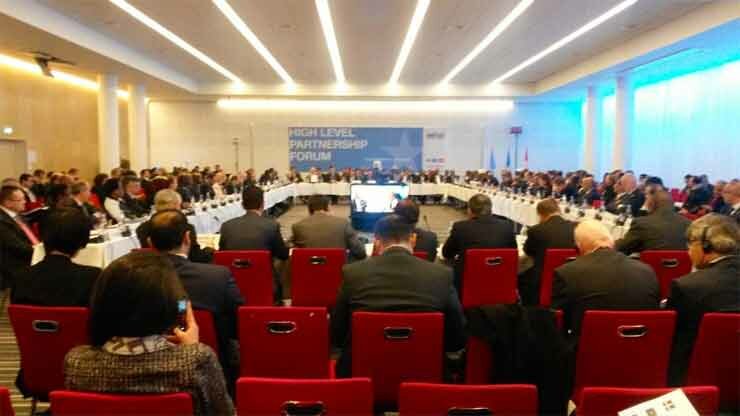Fighting the Somali pirates: Daring deeds or boring blockade?
The destroyer is named after William Bainbridge, a naval officer who played a less than glorious part in the first U.S. war against Muslim pirates, the struggle against Tripoli in Libya at the start of the 19th century.
The frigate commanded by Commodore Bainbridge accidentally went aground near Tripoli in 1803, leading to the capture of both ship and crew. American honour was restored the following year when Cmdre. Stephen Decatur led a daring raid on Tripoli harbour and burned the captured American frigate.
Such bold actions won fame for Cmdre. Decatur, but it was the American government’s decision to keep a naval squadron in the Mediterranean and maintain a continuous blockade of Tripoli that finally led the port’s ruler to come to terms in 1805.
Cmdre. Bainbridge was released from captivity and later restored his naval reputation by success against the British in the War of 1812. Cmdre. Decatur also added to his laurels in that conflict, then, in 1815, returned once more to fight the Barbary corsairs of North Africa, leading a successful campaign against Algiers.
Recent events seem likely to increase naval operations by the United States and other countries against the Muslim pirates of Somalia, but which course of action will they follow? Daring raids on pirate strongholds in the tradition of Cmdre. Decatur? Or prolonged blockade such as that which eventually freed Cmdre. Bainbridge?
Given the large areas of sea involved, naval patrols by a few dozen warships are unlikely to curb the activities of the Somali pirates. The obvious alternative is to attack the pirates in their home ports. This can be done by either blockade or bombardment.
In the struggle against the Barbary pirates of North Africa between the 16th and 19th centuries, the European naval powers bombarded pirate bases such as Algiers, Tunis and Tripoli on a number of occasions. Such action often forced the local rulers to come to terms, but such treaties usually proved short-lived, while civilian casualties inflicted by the bombardments only further antagonized the pirate communities.
Today, the idea that the armed forces of the United States should bombard a Somali pirate port such as Eyl into ruins is clearly unthinkable. Even “smart” munitions would still inflict collateral damage on local civilians, as events in Iraq and Afghanistan have shown, while commando raids to free captured ships and crews would still demand levels of fire support that would inflict considerable damage on the local area.
Bombardment is thus not a viable proposition today, so what about a naval blockade of the pirate bases? This would not need to cover the whole of Somalia’s long coastline. Southern Somalia is largely controlled by Islamists who are hostile to pirate activities. Much of the northern coast of Somalia, on the Gulf of Aden, is ruled by the self-declared state of Somaliland which also does not support piracy.
The Somali pirates are concentrated in the semi-autonomous region of Puntland, which occupies the actual “horn” of Africa. There are no more than half a dozen significant ports here to which large captured vessels could be brought.
Currently, American and other warships patrolling off Somalia use bases such as Djibouti or Mombasa in Kenya to support their activities, but these ports are distant from the main pirate strongholds in Puntland. A better course of action would be to persuade Yemen to allow an international blockading force to use its island of Socotra, just off the horn of Africa, as its principal base. Pirate ports such as Eyl on the Indian Ocean and Bosaso on the Gulf of Aden could then be more easily reached and contained by blockade patrols.
The number of warships patrolling off Somalia is steadily increasing. If they are to have any success in curbing the activities of the Somali pirates, then they need to be part of a co-ordinated international force blockading the main pirate bases, rather than patrolling aimlessly around the Gulf of Aden and the Indian Ocean.
Some commentators have argued that in the long run Somali piracy can be stopped only by developments ashore. This may be true, but in the short to medium term, there is little likelihood of this happening.
There has not been an effective Somali national government since 1991 and there is little sign of one appearing in the near future and imposing its rule on the pirate ports. Similarly, it is very unlikely that the United States and its allies will be ready to send ground forces into Somalia to restore law and order. The Black Hawk Down episode of 1993 still casts a long shadow.
Naval blockade of Somali pirate ports probably offers the best way to curb local piracy. It will no doubt be a lengthy commitment, but in the end if the pirates cannot put to sea, they will have to turn elsewhere to earn a livelihood. More violent action against Somalia’s pirates will only drive them into the arms of the country’s militant Islamists, while hopes of a revived Somali national government imposing order ashore seem unrealistic. A warship patrolling outside every Somali pirate port is worth a dozen scattered across the vast expanse of the western Indian Ocean.
Alan G. Jamieson is author of Faith and Sword: A Short History of Christian-Muslim Conflict.
Comments
comments
 Calendar
Calendar




































